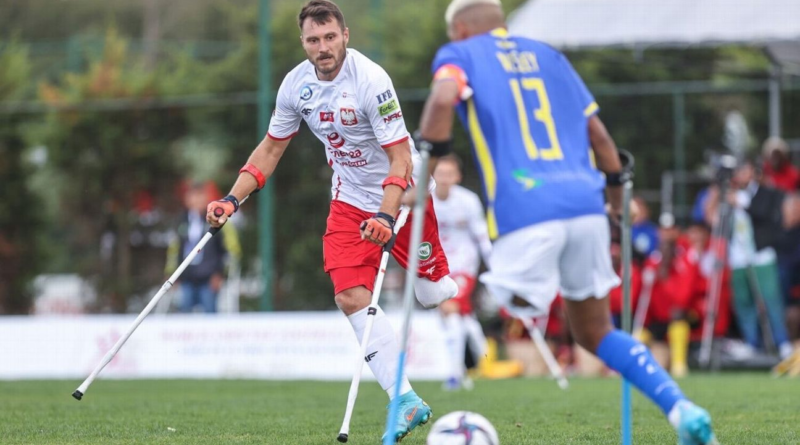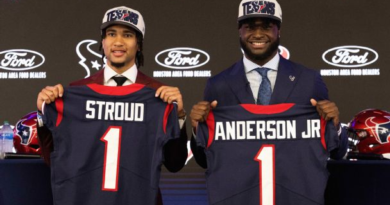'It just felt like magic': Amputee football's first Puskas Award nominee, winner tells ESPN about his wonder goal
Editor’s Note: This has been republished to reflect Oleksy winning the Puskas Award, which was announced on Feb. 27 by FIFA.
“My favourite goal is the one from Dimitri Payet, then Kylian Mbappe, and then Francisco Gonzalez Metilli.” Marcin Oleksy is giving his verdict on the top goals among the nominations for the 2022 Puskas Award, FIFA’s prize for the best goal scored by anyone, anywhere over the course of the year.
– Stream on ESPN+: LaLiga, Bundesliga, more (U.S.)
But he is not merely offering his opinion with friends in a bar or on social media like the countless fans who have cast their votes for the winner; Oleksy is assessing the competition as a peer up against stars such as Paris Saint-Germain‘s Mbappe, Tottenham Hotspur‘s Richarlison and Manchester United‘s Alessia Russo after becoming the first-ever amputee footballer to be shortlisted for the prize.
Mbappe may have made the initial 11-player shortlist for one of the goals in his 2022 World Cup final hat trick, but his name is not among the three finalists for the Puskas Award. Instead, Oleksy will be up against Payet and Richarlison to claim the prize at The Best FIFA Awards gala on Feb. 27, and he rates the Frenchman’s goal very highly.
“It’s the decision he took to score from that area of the pitch, the strength of the shot and the technique,” he tells ESPN, in an interview conducted via a translator, of Payet’s sumptuously arrowed long-range strike for Marseille. “You have to be really technically good to score this goal so precisely from that area.”
Those same words could also be used to describe the goal that earned Oleksy his own place among such illustrious company. The 36-year-old got the nod for his stunning overhead kick for Warta Poznan in November against Stal Rzeszow, which he scored by planting one of his crutches with his back to goal and swivelling in mid-air to connect with a high volley that gave the goalkeeper no chance.
“When I saw how the ball was played toward me, at the height it was, I thought ‘this could be something beautiful,'” he says of the goal, scored just weeks after he played five games for Poland at the WAFF Amputee Football World Cup in Turkey. “So I just hit it. I was following it with my eyes, and when I saw it in the net it just felt like magic.
“During practice, we don’t really often try to do these kinds of shots. But when I started playing amputee football, I always wanted to do something special.”
It wasn’t long before the goal was being seen by many others who agreed on just how special it was. It opened people’s eyes to amputee football — the seven-a-side game in which competitors have a limb difference and outfielders play using forearm crutches — as a sport capable of delivering moments of great skill and athleticism, if indeed they were aware of it at all. Less than 24 hours after Oleksy’s right boot had fired the ball into the bottom corner, he had officially gone viral not just in Poland, but worldwide.
“I found out the next day, because the big TV stations and sports outlets started to show it,” he says. “I knew then that it was going to be something big in Poland, but not across the whole world.”
– Puskas Award: Watch all the nominated goals here
Oleksy barely had time to get over his brief brush with global fame before a second, bigger wave of it hit him. In January, his goal was deemed by FIFA to be one of the 11 best scored across the world in 2022, and he had some high-profile support campaigning for votes on his behalf.
“It was a weird feeling in the beginning,” he says. “I didn’t believe it at all, that it was me that had been nominated. But afterward I started to process the information, I became used to it. Right now, it makes me happy. It brings me joy to think that it came to me.
He adds: “[Poland and Barcelona striker Robert Lewandowski] shared the goal on his social media, and also the information about the nomination and the voting. I hope that Lewy voted for me, too!”
Oleksy, who lives in the small town of Lugi between the cities of Poznan and Wroclaw and not far from his hometown of Nowa Sol, had previously been a goalkeeper before suffering the injury that led to his left leg being amputated below the knee. He had his day job as a construction worker and played between the posts for clubs in Poland’s lower leagues, enjoying his best years at fourth-tier Korona Kozuchow. “When I was playing at regional level, especially indoors, I was always the best,” he says. “I must have played at 20 tournaments and I was always voted the best goalkeeper.”
But that all changed one day in 2010, which began as a normal Saturday at work. While waiting for a machine to cover a hole in the road Oleksy heard a loud noise and, before he knew it, was lying on the ground.
“I looked around and saw a car which had crashed, and my uncle running around,” he says. “And I looked down and saw my legs and I kind of knew what had happened. The only thing that was in my mind was that I had to stay alive, you know; ‘I cannot die.’ I was thinking only about this.
“I was still conscious when the ambulance came. I lost consciousness on the way to the hospital. There I remember the X-ray machine and the huge pain that I could feel. At the beginning I didn’t feel the pain at all, probably because of the adrenaline. And then I woke up in surgery, and after three hours I woke up again after the operation. I looked up and saw my left leg had been amputated, but I was happy that I was alive, that was the only thing I saw thinking about. I wasn’t really aware of what had happened, you know?
“My family was already there, so I didn’t have time to process it. I didn’t want my family to feel sad when they saw me. So I started to make jokes about my leg already. I tried to stay positive for my family.”
With his partner pregnant with their first child, and facing his new life as an amputee, sport could not have been further from Oleksy’s mind. It took nine years, and the yearning to kick a ball with his son, Tomasz, that ushered in a new chapter of his sporting life.
“I always had a dream that when I had a son I would like to play football with him,” he says. “So when I got a sports prosthetic I took him to the football pitch and we started playing, and I felt like I wanted to get back to it again.
“I started to coach goalkeeping for kids. Then I found out about an opportunity to play amputee football for Warta Poznan. After the first training session, I knew I wanted to stay and play football again.”
No one could have predicted at that first training session that it would lead to Oleksy being nominated for a prize that has been won in the past by stars including Cristiano Ronaldo, Neymar, Mohamed Salah and Son Heung-Min. Now, he has a one-in-three chance of winning it. But whatever happens, Oleksy is happy to represent a sport he has only been playing for a few years on the global stage.
“It’s really rewarding to be nominated for this sport,” he says. “I’m happy that the fans will see that the guys who are on crutches are playing football and they are doing amazing things. And also, based on the comments that I can read under the video, most of the fans are saying ‘wow, this is amazing,’ ‘this is unbelievable.'”
Unsurprisingly, Oleksy regards his goal against Stal Rzeszow as the best he has ever scored, but he thinks it may not be the best one that he will ever score.
“There’s going to be another, more beautiful one,” he says. “It’s coming.”
Editor’s note: This article has been updated since it was first published on Feb. 8, 2023



